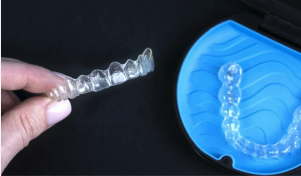Tooth sensitivity is a very common dental issue – causing discomfort when you have hot or cold drinks and food while brushing your teeth and even breathing in cold air. While plenty of toothpaste on the market claims to improve tooth sensitivity, a more effective and lasting solution could be composite bonding for sensitive teeth.
Composite bonding is a cosmetic dental treatment that can fix functionality issues like tooth sensitivity. In this blog post, we’ll explore what composite bonding is, how it works, and how it can treat sensitive teeth. We’ll also discuss its benefits over other dental treatments and what to expect from the procedure and recovery process.
What Is Composite Bonding, And How Does It Work?
Composite bonding involves applying a tooth-coloured composite resin material to the teeth. Made of a combination of plastic and glass, the resin is designed to mimic the natural look of teeth. The material is bonded to the teeth with a special adhesive, and it can be shaped and moulded to create the desired look. Once the resin is in place, it’s hardened using a special light, and the tooth is polished to give it a natural appearance.
Composite bonding is an effective treatment for a variety of dental issues, including repairing chipped or cracked teeth, filling gaps between teeth, and improving the overall appearance of teeth.
How Can Composite Bonding Be Used To Treat Teeth Sensitivity?
Tooth sensitivity is often caused by receding gums or enamel erosion, which exposes the softer, more sensitive part of the tooth called the dentine. When this happens, hot and cold temperatures can stimulate the nerve inside the tooth, causing discomfort. By applying a layer of composite resin to the affected area, the exposed dentine is covered, and the sensitivity is reduced or eliminated.
How Does Composite Bonding Compare To Other Dental Treatments?
Composite bonding is a great alternative to other dental treatments like veneers or crowns. Veneers require removing a significant amount of tooth structure to make room for the veneer, while composite bonding is a minimally invasive treatment that doesn’t require any tooth structure removal. Unlike crowns, composite bonding is a reversible treatment, and it’s much more affordable.
What Should I Expect From The Composite Bonding Procedure, And How Long Is The Recovery Time?
The composite bonding procedure usually takes about an hour per tooth. During the treatment, your dentist will:
- Select a shade of composite resin that matches the natural colour of your teeth.
- Roughen the surface of the tooth to create a better bond with the resin.
- Apply the composite resin to the tooth and shape it to the desired size and shape.
- Use a special light to harden the resin and then polish it to give it a natural look and feel.
Recovery time after composite bonding is minimal. You can return to your normal activities immediately after the procedure, and there are no special instructions to follow. However, you may experience some sensitivity to hot and cold temperatures for a few days afterwards.
How Much Does Composite Bonding Typically Cost?
The cost of composite bonding varies depending on the extent of the treatment and the location of the dentist. Overall, composite bonding is generally more affordable than other dental treatments like veneers or crowns. It’s also worth noting that many dental insurance plans cover composite bonding as it can fix functionality issues like tooth sensitivity.
What Qualifications Should I Look For In A Cosmetic Dentist?
Before you commit to getting cosmetic work done on your teeth, it’s important to find a dentist who has the right qualifications, experience and expertise to ensure that you get the results you want.
Here are some things you should look for when selecting a cosmetic dentist:
Training and Experience: Look for a cosmetic dentist who has extensive training and experience in cosmetic dentistry. Ask about their educational background, certifications, and continuing education courses they have taken in the field of cosmetic dentistry. A skilled and experienced cosmetic dentist will have a thorough understanding of the latest techniques and technology in the industry and will be able to recommend the most appropriate treatment for your unique needs.
Specialisation: Cosmetic dentistry requires specific expertise in various techniques and procedures. You should always look for a dentist who specialises in the type of cosmetic dentistry you are interested in, whether it’s teeth whitening, veneers or composite bonding. This will ensure the dentist has the necessary skills and knowledge to provide the best possible results.
Portfolio of work: A reputable cosmetic dentist will have a portfolio of before-and-after photos of their previous patients’ work. Ask to see the portfolio and evaluate the quality of their work. This will give you an idea of the dentist’s skill level and the kind of results you can expect.
Technology and equipment: Look for a cosmetic dentist who uses the latest technology and equipment. Advanced technology and equipment can improve the accuracy, safety, and effectiveness of cosmetic dental procedures.
Patient reviews and testimonials: Read patient reviews and testimonials online to understand the dentist’s reputation and track record. You can also ask for referrals from family, friends, or your regular dentist.
Communication and patient care: This is absolutely key – and what often marks out one dental practice above another. A good cosmetic dentist should be a good communicator who listens to your concerns and questions and provides clear and honest answers. At Ollie & Darsh, we prioritise patient care and ensure that you are comfortable from the first phone call right through to the treatment and the aftercare. We pride ourselves on maintaining good relationships with our patients so they keep on coming back to us for all their dental needs.
How Can I Make Good Oral Health Choices To Avoid Teeth Sensitivity?
Maintaining good oral hygiene is the best way to prevent tooth sensitivity. Brushing your teeth twice a day with fluoride toothpaste, flossing daily and using mouthwash can all help remove plaque and bacteria that can cause tooth sensitivity. Also, you should avoid acidic and sugary foods and drinks as they can erode the enamel on your teeth, leading to sensitivity. Finally, regular dental check-ups and professional teeth cleaning can help detect and prevent dental issues before they become serious.
Contact Ollie & Darsh Today
Composite bonding is a really effective dental treatment for anyone suffering from tooth sensitivity. It’s minimally invasive, affordable, and can give you immediate relief from sensitivity while improving the appearance of your teeth. If you’re interested in composite bonding, be sure to find a qualified cosmetic dentist who has experience in this area. Do make sure you maintain good oral hygiene to avoid dental issues like tooth sensitivity and enjoy a healthy, beautiful smile.
If you’re interested in the composite bonding treatment for sensitive teeth at Ollie & Darsh, please get in touch on our contacts page or book online.

